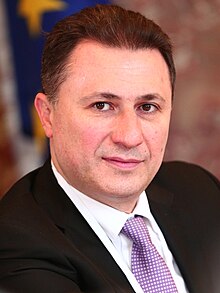
Back نيكولا غرويفسكي Arabic نيكولا جرويفسكى ARZ Нікала Груеўскі BE-X-OLD Никола Груевски Bulgarian Nikola Gruevski BS Nikola Gruevski Catalan Nikola Gruevski Czech Nikola Gruevski Danish Nikola Gruevski German Νίκολα Γκρούεφσκι Greek
Nikola Gruevski | |
|---|---|
 Gruevski in 2015 | |
| 7th Prime Minister of Macedonia | |
| In office 27 August 2006 – 18 January 2016 | |
| President | Branko Crvenkovski Gjorge Ivanov |
| Preceded by | Vlado Bučkovski |
| Succeeded by | Emil Dimitriev |
| Leader of the Opposition | |
| In office 31 May 2017 – 23 December 2017 | |
| President | Gjorge Ivanov |
| Preceded by | Zoran Zaev |
| Succeeded by | Hristijan Mickoski |
| Minister of Finance | |
| In office 27 December 1999 – 11 January 2002 | |
| Prime Minister | Ljubčo Georgievski |
| Preceded by | Boris Stojmenov |
| Succeeded by | Petar Gosev |
| Personal details | |
| Born | 31 August 1970 Skopje, SR Macedonia, SFR Yugoslavia |
| Nationality | |
| Political party | VMRO-DPMNE |
| Spouses | Suzana Arbutina
(m. 2001; div. 2005)Borkica Gruevska
(m. 2007; div. 2022)
|
| Children | Anastasija Sofija |
| Alma mater | Ss. Cyril and Methodius University of Skopje |
Nikola Gruevski (Macedonian: Никола Груевски, pronounced ['nikɔla 'ɡruɛfski] ⓘ; born 31 August 1970) is a former Macedonian politician who served as Prime Minister of Macedonia from 2006 until his resignation, which was caused by the 2016 Macedonian protests, and led the VMRO-DPMNE party from 2004 to 2017. He is the longest serving post-independence Macedonian prime minister, serving more than nine years in office.
His reign was characterized with accusations of authoritarianism, with allegations of electoral fraud and misuse of state resources in campaigning. He was found to have authorized the wiretapping of more than 20,000 people in Macedonia, mostly state officials.
Under his leadership the country which had pro-European and pro-NATO policy, has changed sides to pro-Russian, pro-Serbian and anti-Western one.[1][2][3][4] He has opposed treaties with Bulgaria in 2017 and the Prespa agreement signed with Greece in 2018.
Under the Pržino Agreement mediated by the European Union, Gruevski agreed to resign and left his post on 18 January 2016.[5]
In May 2018 he was sentenced to two years in prison on corruption charges.[6] In November 2018 he was ordered to serve his sentence but failed to check-in with authorities and instead fled[7] to Hungary, where he sought and was granted political asylum.[8] He has been accused of promoting the controversial identity politics called antiquization. In April 2022, he was added to the US Treasury's Specially Designated Nationals List of individuals facing Balkans-related sanctions and the US Department of State's corruption related sanctions.[9][10] Also in April, he was sentenced in Skopje to 7 years in prison on charges of money laundering and illegal acquisition and concealment of state property.[11]
- ^ Jasmin Mujanovic, Hunger and Fury: The Crisis of Democracy in the Balkans, Oxford University Press, 2018, ISBN 0190877391, pp. 115; 162.
- ^ Sarantis Michalopoulos, Tensions grow before biggest secret is revealed: FYROM's new name, EURACTIV Jan 18, 2018.
- ^ Vassilis Petsinis, From pro-American to pro-Russian? Nikola Gruevski as a political chameleon. 22 May 2015. openDemocracy Archived 21 November 2018 at the Wayback Machine.
- ^ Aubrey Belford et al., Leaked Documents Show Russian, Serbian Attempts to Meddle in Macedonia. 04 June 2017, Organized Crime and Corruption Reporting Project.
- ^ "Macedonia Premier to Step Down Under Western-brokered Deal". VOA. 14 January 2016. Retrieved 15 June 2022.
- ^ Cite error: The named reference
BalkanEUwas invoked but never defined (see the help page). - ^ Cite error: The named reference
ArrestWarrantwas invoked but never defined (see the help page). - ^ Cite error: The named reference
AsylumGrantedwas invoked but never defined (see the help page). - ^ "Balkans-related Designations and Designations Removals". U.S. Department of the Treasury. Retrieved 11 April 2022.
- ^ "Public Designation of Former Officials of the Republic of North Macedonia and Bosnia and Herzegovina Due to Involvement in Significant Corruption". state.gov.
- ^ Йоана Кръстева, Осъдиха бившия македонски премиер Никола Груевски на 7 години затвор. 21 април 2022 Дир.бг.